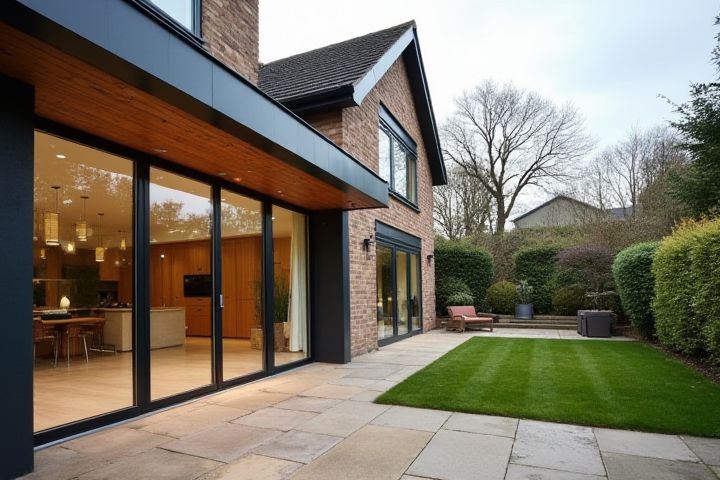
Adding a house extension can significantly increase your property's value and provide much-needed additional space. Consider the benefits of expanding your living area, whether it's for a larger kitchen, an extra bedroom, or a home office that suits your lifestyle. It's essential to check local regulations and obtain necessary permits to ensure compliance with zoning laws. Investing in quality materials and professional services will enhance durability and aesthetics, ultimately contributing to your home's appeal. Evaluate your current and future needs to determine if a house extension aligns with your long-term goals.
Should You Add A House Extension
Planning permission requirements
When considering a house extension, it is crucial to understand the planning permission requirements that vary by location. Typically, you need to submit a planning application if your extension exceeds specific size limitations or impacts neighboring properties. Local zoning laws may also dictate design and material choices to ensure the extension harmonizes with the existing structure. Before beginning your project, consulting with a planning officer can ensure you comply with regulations and avoid potential setbacks.
Budget considerations
When planning a house extension, budget considerations are crucial for ensuring the project aligns with your financial capabilities. Examine factors like construction materials, labor costs, and the overall design to create an accurate estimate. Allocate funds for unexpected expenses, typically ranging from 10% to 20% of your total budget, to safeguard against unforeseen issues. By carefully estimating these costs, you can make informed decisions that enhance your home's value while staying within your financial limits.
Structural integrity
When considering a house extension, evaluating the structural integrity is crucial to ensure safety and longevity. A well-designed extension can increase your property's value by up to 20%, but neglecting structural assessments can lead to significant issues, costing thousands in repairs. It's vital to consult with a structural engineer, who will analyze load-bearing walls, foundation stability, and materials required for a safe build. You should also obtain necessary building permits to comply with local regulations, as failure to do so may result in costly fines or mandatory reconstruction.
Local building regulations
Local building regulations play a crucial role in the process of adding a house extension. Understanding specific zoning laws, which can vary by municipality, ensures compliance and may prevent costly fines or project delays. Typically, extensions must adhere to height restrictions, property line setbacks, and design guidelines, which often require you to submit detailed plans for approval. Before starting your extension, consult local authorities to obtain necessary permits and clarify any unique requirements applicable to your area.
Impact on property value
A house extension can significantly enhance your property's market value by expanding usable living space and improving overall functionality. When considering a project, prioritize design elements that align with local real estate trends to maximize potential return on investment. Well-executed extensions, such as adding a conservatory or an extra bedroom, can appeal to families and potential buyers alike, thereby increasing demand. You should also consider energy-efficient features, as they not only reduce utility costs but also attract environmentally conscious buyers, further boosting your property's value.
Home insurance adjustments
When considering a home extension, it's essential to evaluate how this structural upgrade can affect your home insurance policy. Many insurers require an adjustment in coverage to account for the increased value of your property, as the extension will often enhance both the size and market worth of your home. Failing to update your policy could leave you underinsured in the event of damage or loss, ultimately impacting your financial stability. To ensure comprehensive protection, consult with your insurance agent to understand the implications of your extension on your coverage.
Contractor selection
Choosing the right contractor for your house extension is crucial to ensure quality and compliance with local building regulations. A contractor's experience with similar projects can often be verified by checking online reviews or requesting references from past clients, which typically show a project completion rate of around 90% within planned timelines. Your budget should outline not only construction costs but also potential overruns, as 30% of renovation projects experience unexpected expenses. Prioritize contractors who are licensed and insured, as this adds a layer of protection and peace of mind throughout the renovation process.
Potential disruption during construction
When planning a house extension, consider the potential disruption that the construction process may cause. This can include noise pollution from machinery and equipment, which may affect your comfort and daily routine. There may also be limitations on access to certain areas of your home, particularly if you're expanding into your backyard or side yard. Proper planning and communication with contractors can help mitigate these disruptions, ensuring a smoother transition during the construction phase.
Design consistency with existing structure
Design consistency with your existing structure is essential when adding a house extension to maintain architectural harmony and enhance property value. Aim for a cohesive aesthetic by matching materials, colors, and architectural styles; for instance, if your home features red brick, consider using the same material for the extension. This approach not only contributes to visual appeal but also ensures compliance with local building regulations, which often emphasize maintaining the neighborhood's character. According to design experts, properties that integrate seamlessly with their surroundings can see value increases of up to 20%, making your extension a wise investment.
Energy efficiency enhancements
When considering a house extension, prioritizing energy efficiency can significantly reduce your utility bills and environmental impact. Upgrading insulation and installing energy-efficient windows, rated at least double-glazed, can enhance thermal performance by up to 30%. Incorporating renewable energy sources, such as solar panels, can generate an average of 3,000 kilowatt-hours annually, further decreasing energy costs. Investing in energy-efficient appliances and sustainable materials can elevate your home's energy efficiency rating, positively influencing its market value.
